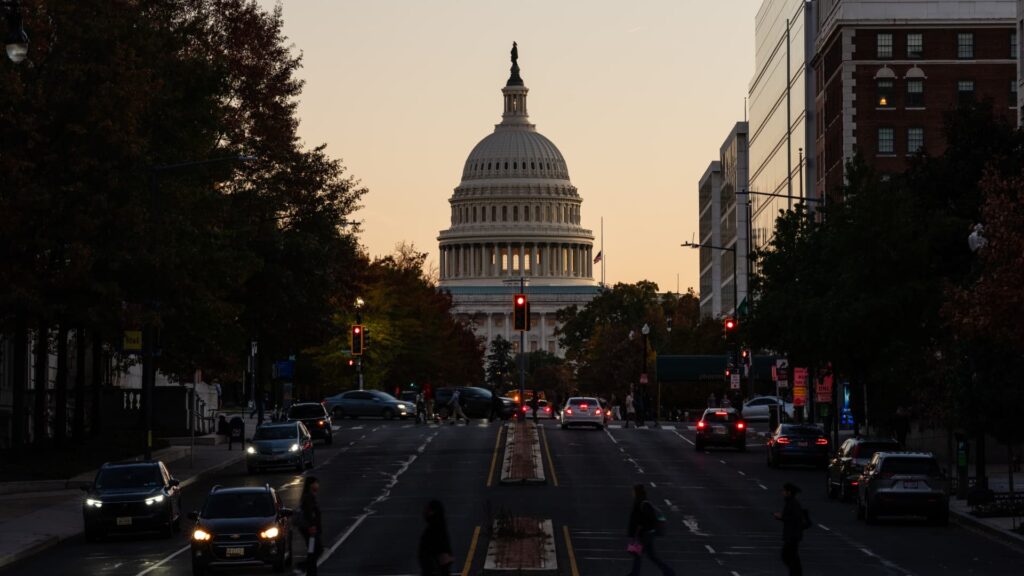On a pivotal evening in Washington, the U.S. Senate was poised to approve a critical deal aimed at ending a month-long federal government shutdown that commenced on October 1. A source disclosed that enough Democratic senators have signaled their support for the agreement, which would extend government funding until the end of January 2026. Despite the absence of an extension for enhanced tax credits under the Affordable Care Act—a crucial point of contention for Democrats—the proposal includes a commitment to vote on this extension in December, affecting over 20 million Americans currently reliant on these subsidies.
| Article Subheadings |
|---|
| 1) Overview of the Senate Deal |
| 2) Key Players in Negotiation |
| 3) Implications for the Affordable Care Act |
| 4) Funding for Federal Workers and SNAP |
| 5) The Path Forward |
Overview of the Senate Deal
The deal reached in the Senate promises to provide crucial funding for federal operations, aiming to resolve the government shutdown that has impacted many services and federal employees since the beginning of October. Under this agreement, the government would continue its operations until late January, ensuring that essential services remain available to the public. This agreement has been described by various political figures as a necessary step towards stabilizing government functions amid ongoing budget disagreements.
Key Players in Negotiation
The negotiations leading to this deal involved significant efforts from Senate Majority Leader John Thune of South Dakota, who played a central role in brokering the agreement with the White House and Democratic senators. Among those involved were Democratic Senators Jeanne Shaheen and Maggie Hassan from New Hampshire, and Independent Senator Angus King from Maine. Their collaboration underscores the bipartisan approach necessary to garner the required votes through the 60-vote minimum threshold for legislative approval. However, the stance of Senate Minority Leader Chuck Schumer indicates a divide, as he expressed strong opposition to the agreement.
Implications for the Affordable Care Act
Significantly, the deal has not addressed the extension of enhanced tax credits for the Affordable Care Act, a key issue for many Democratic senators. These tax credits, which are set to expire by the end of December, assist over 20 million people in managing their health insurance costs. In response to this exclusion, the agreement features a provision ensuring a vote in December to extend these essential subsidies. While this compromise may alleviate some immediate pressures, the ramifications of not securing a more robust agreement could lead to escalating healthcare costs in the future, as pointed out by leader Chuck Schumer.
Funding for Federal Workers and SNAP
Aside from healthcare discussions, the deal also proposes measures to guarantee the normal salaries of federal workers during the shutdown, which has left many unable to work. Further, the proposal includes provisions to prevent permanent layoffs within the federal workforce, aiming to safeguard jobs through at least the end of fiscal year 2026. Another significant aspect of the agreement is funding for the Supplemental Nutrition Assistance Program (SNAP), which benefits millions of Americans by providing food assistance. This aspect of the deal emphasizes the necessity of supporting vulnerable populations during times of budgetary strife.
The Path Forward
Moving ahead, the deal must acquire approval from the House of Representatives and receive the President’s signature to take effect. Senator Tim Kaine from Virginia has expressed his intention to support the deal, recognizing the importance of addressing the healthcare tax credit issues separately. Moreover, the agreement introduces a requirement for a more collaborative budget process, potentially leading to fewer crises related to government funding in the future. As discussions progress, public opinion—which favors extending healthcare subsidies—could influence senators’ final resolutions before they face reelection.
| No. | Key Points |
|---|---|
| 1 | The Senate is on track to pass a deal to end the federal government shutdown that began on October 1. |
| 2 | The agreement would fund government operations through January 2026. |
| 3 | There is significant concern about the expiration of Affordable Care Act tax credits for millions of Americans. |
| 4 | The deal ensures payment for federal workers during the shutdown and prevents layoffs. |
| 5 | Approval from the House is necessary for the deal to take effect and is crucial for future bipartisan negotiations. |
Summary
The Senate’s progress towards passing an agreement to end the government shutdown marks a significant moment in congressional negotiations, albeit with unresolved issues surrounding healthcare subsidies. The inclusion of protections for federal workers and food assistance programs within the deal showcases a commitment to supporting American families during uncertain times. As representatives weigh the implications of this agreement, their decisions will reflect not only immediate needs but also the broader landscape of healthcare policy in the United States.
Frequently Asked Questions
Question: What are the main components of the Senate deal?
The main components include government funding through January 2026, a vote in December on the extension of Affordable Care Act tax credits, and protection for federal workers with guaranteed salaries during the shutdown.
Question: Why is the Affordable Care Act tax credit extension significant?
The ACA tax credit extension is significant as it impacts over 20 million Americans, helping them afford health insurance. The expiration of these credits could lead to much higher insurance costs for these individuals.
Question: How does this deal affect federal workers?
This deal guarantees that federal workers will be paid their usual salaries during the shutdown and prevents permanent layoffs through the end of fiscal year 2026.
